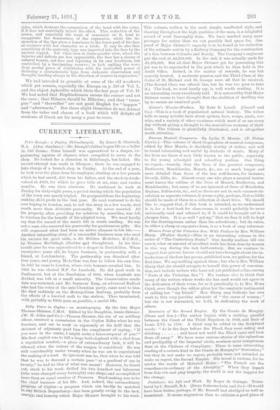Fifty Years in Ceylon : an Autobiography. By the late
Major Thomas Skinner, C.M.G. Edited by his Daughter, Annie Skinner. (W. H. Allen and Co.)--Thomas Skinner, the son of an artillery .officer, received a commission in the Ceylon Rifles when he was fourteen, and set to work so vigorously at his drill that the strictest of adjutants paid him the compliment of saying "If you were in the ranks, I might make a lance-corporal of you!" His first exploit was to kill a huge bull-elephant with a shot from a regulation musket,—a piece of extraordinary luck, it will be allowed; when the nature of the weapon is considered. He was still considerably under twenty when he was set to superintend the making of a road. So ignorant was he, that when ho was told that be was to descend a certain pass "at a gradient of one in twenty," he had no idea of what was meant! However, he found ,out, stuck to his work, drilled his two hundred raw labourers (who wore changed every fortnight) into shape, and accomplished more than an equal number of Pioneers. Road-making was to be the chief business of his life. And, indeed, the extraordinary progress of Ceylon—a progress which can hardly be matched ill any British Dopendeney—has been greatly owing to the tact, energy, and honesty
which Major Skinner brought to his work. This volume, written in the most simple, unaffected style, and showing throughout the high qualities of the man, is a delightful record of work thoroughly done. We have marked many more Passages for notice than we can possibly find space for. One proof of Major Skinner's sagacity is to be found in his reduction of the estimate sent in by a Railway Company for the construction of a line between Colombo and Kandy. The Company's engineers put the cost at 42,214,000. In the end, it was actually made for 41,285,000. But all that Major Skinner got for preventing this job was to be superseded in the post which he then held in the Audit Office. Indeed, in the matter of rewards, he was but scurvily treated. A moderate pension and the Third Class of the Order of St. Michael and St. George were all that he received. (The Second Class was offered him, but he was too poor to take it.) The book, we need hardly say, is well worth reading. It is an interesting story excellently told. It is noteworthy that Major Skinner seems to have thought that the abolition of duelling was by no means an unmixed good.


































 Previous page
Previous page